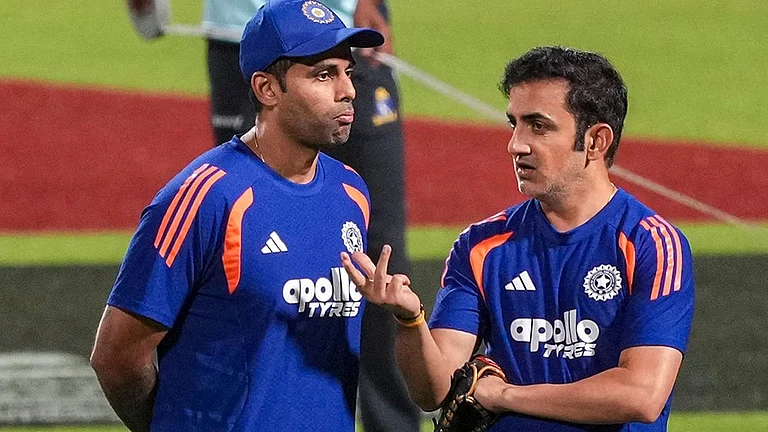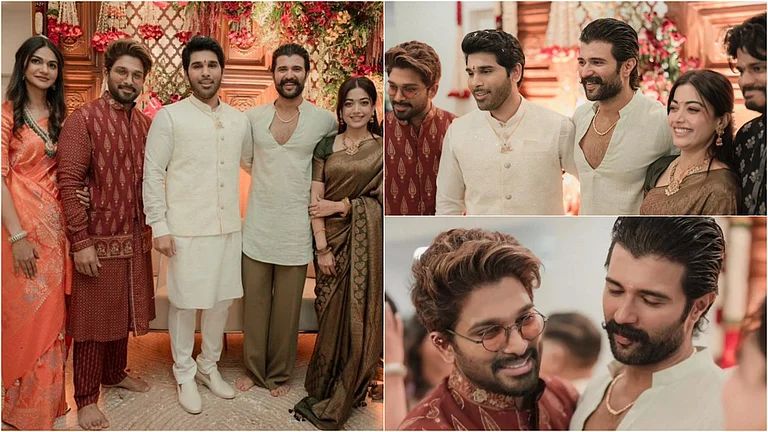If sex plays a strange role in our lives, celibacy plays an even stranger one. We grow up hankering after sex, only to be told that it is actually a four-letter word and that celibacy might have been the way to go. This is not a chicken and egg story. Sex clearly came first. But then, what happened? Somewhere along the way, it became a bit of an obsession—a distraction; a preoccupation; and an obstacle in the pursuit of a higher life. And so came the diktats against it.
Our ancestors were among the earliest ones to obsess about sex. Because the rishis (sages) in Hindu mythology aspired for a higher purpose in life, sex was clearly something that came in the way. This angered our gods who saw this as human comeuppance; so they sent apsara after apsara (celestial nymphs in Hindu mythology) to distract the rishis. The gods obviously feared the power of a meditating human. Or perhaps, they felt sex was a mandate for life on earth and humans had no business turning their backs on it. Indra, the king of the gods, first sent the apsara Menaka to tempt Sage Vishawamitra while Vayu, the god of the winds, helped the cause by sending a strong gust of wind to disrobe her (à la Marilyn Monroe). The poor Vishwamitra, beholding the spectacle, or the creature, capitulated.
But men have been determined to show they’re made of sterner stuff. The disease of celibacy spread far and wide. The Catholic Church advocated celibacy (but only after the first 1,000 years of its spread): its monks and nuns of most orders were celibate and this practice continues, by and large, to this day. “Clerics are obliged to...observe celibacy, which is a special gift of God,” Matthew’s Gospel has Christ declaring, “…and there be eunuchs, which have made themselves eunuchs for the kingdom of heaven’s sake.” What was once supposedly a personal act, a resolve, was now being presented as God’s command.

Celibacy was seen in Buddhism in different parts of the world, in Jainism in India although it is accepted that Judaism and Islam didn’t really encourage or approve of celibacy. So, in organised religion too, there’s confusion about how much importance is needed to be accorded to the priest and his/her sexuality. After all, a priest who cannot resist temptation can hardly ask others to do so. But then a priest who’s celibate can hardly be expected to know the strength of the attraction of sex. So, the attempt to deny sex is also a gigantic tribute to its power.
There are whispers of one such club of middle-aged men in our very own backyard—in Nagpur. It promotes ‘bachelorhood’, we’re told. While there is no general fiat against sex, there is an unwillingness to look it in the face. So, as one moves up the ladder, also called the hierarchy, the requirement for celibacy grows. Two factors are at the root of this fixation. One is misogyny and the other is ignorance masquerading as science.
First, ignorance—evident in the belief that semen preserved adds to brain power. There is no basis for this, of course, and then there is the fact that most of the world’s brilliant scientists, in all likelihood, didn’t get there by suppressing ejaculation. Nor did sportspersons, boxers or politicians.
But why misogyny? Because here, there, and elsewhere, men seem to have some kind of a monopoly over celibacy. It was their thing. It is their thing.
Yes, we know that nuns are also supposed to be celibate but that’s because nuns, in general, were not the founders of their own orders whose rules were determined by men. So, one can hypothesise that women were asked to be celibate; they didn’t choose to be. While there have been virgin queens—bachelor queens—who have reigned, and reigned for long, they didn’t make an ideology out of it. Nor did women have any overarching concern about ‘preserving semen’. Men did. Men do.

Men posture that there’s virtue in havingcontrol over one’s semen. One witnesses hordes of wrestlers trampling over each other in an effort to retain semen. MK Gandhi, too, believed in the virtue of preserving semen, as do our sadhus, yogis and politicians. It’s clearly a win-win situation. If you’re virile and a stud, you’re a ‘real man’. If, on the other hand, you’re celibate, don’t have sex and preserve your semen, then you’re worth emulating because you’ve shown how to be a real man without soiling your hands. But if we look behind the scenes, this model of celibacy begins to look more like a charade. Hundreds of Catholic priests the world over have their hands full of charges of paedophilia and rape. Closer home, godman after celibate godman have landed in jails, not just accused but also convicted of rape. So, is celibacy merely a front for surreptitious sex?
Anthropologist Joseph S Alter thinks otherwise. Discussing his book Moral Materialism in an interview for Open, he says, “We tend to think of sex in terms of pleasure and procreation. In essence, [I] make a case for understanding masculinity in relation to semen as a material substance shaped by culture.” Alter continues, “Topically, the book focuses on athleticism, celibacy, yoga, and permutations of Ayurvedic medicine. Pehalwans (wrestlers) engage in regimens of training by means of which the production and disciplined retention of semen produces and reproduces embodied strength and strong moral character….Wrestlers engage in training to become strong and successful athletes. But strength and success encompass more than just winning. Through practice, wrestlers come to embody a spectrum of moral virtues that are anchored in the material essence of the body. In this respect, celibacy is understood to be an integral component of physical exercise and diet, as all three regimens are intimately linked to the production and control of semen. Thus, a regimen of dands (jack-knifing push-ups) and baithaks (deep-knee squats), along with jor (sparing), fuelled by a diet of almonds, ghee, and milk—each of which is symbolic of semen but also the material essence of condensed nutritional energy—produces resilient semen, and also produces a kind of virility that is expressed in terms of self-control.”
There you have it: the ideology of semen control. Damned if you do, damned if you don’t. Either way, the man ends up proving his virility. Studs strut about asserting their virility and celibates strut about asserting their chastity. Expressive stud or control freak. Heads I win, tails you lose. We abound in moral superiority.
Celibacy always sits alongside abstinence but these are two completely different beasts. Abstinence could involve a withdrawal from sex with another person but there is no obligation to not help oneself. Many young people today, overburdened with information, flooded with examples of failed relationships, now prefer to abstain from casual sex, unlike their flower child/hippie contemporaries from 50 years ago. The age of Free Love is clearly over but that is not a clean chit for celibacy which rears its head like the proverbial bad penny.
And in India, we are ready for the celibate politician, unlike in the United States, where the likes of Bill Clinton was the stereotype. Very few American politicians have been unmarried. Fewer still, if any, were celibate. If anything, the excitement was in trying to find out who’s been flouting their marriage vows. From cars with tinted windows being driven into John Kennedy’s White House to Bill Clinton’s preoccupation with interns, celibacy has been the least of the American public’s concern. Interestingly, in India, the bachelor politician was not really the norm in the first half century of our independence. Most of our politicians were married, happily or otherwise. Nor was there a whiff of scandal linked with their lives. There was some chatter about Nehru’s involvement with Edwina Mountbatten but that was it. The 21st Century seems to be heralding in a new chapter, however. It started with Atal Bihari Vajapayee although everyone and her uncle knew about his involvements. Along came the bachelors Abdul Kalam, Mamata Banerji, Naveen Patnaik. And now we have Narendra Modi and Yogi Adityanath.
What we do know is that the boys from Nagpur have moved in and with their arrival, the number of men (occasionally women) eschewing sex can only go up. Whether this will raise the hackles of the gods once again, only time will tell.
(Views expressed are personal)
(This appeared in the print as 'The Thing Called Celibacy')
Pankaj Butalia is a Delhi-based filmmaker






















